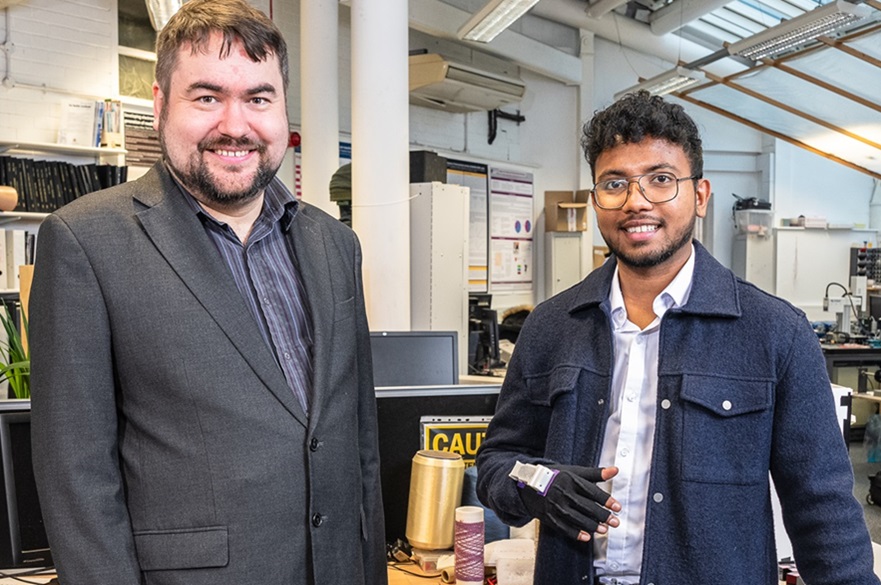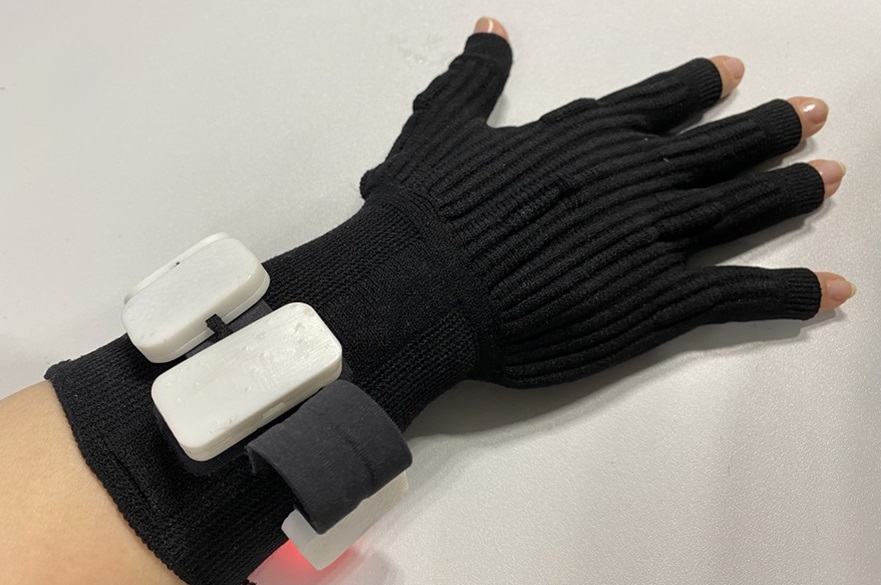Deafblind people to understand live conversations thanks to e-textiles research
By Chris Birkle | Published on 29 April 2025
Categories: Press office; Research; School of Art & Design;
Thousands of people who are born deafblind will understand live conversations for the first time thanks to new research into smart textiles being developed by Nottingham Trent University (NTU).
This world-first study will eventually allow the spoken word to be translated into a form of braille and communicated through e-textiles gloves to the fingers of people who cannot hear or lipread.
Artificial intelligence (AI) will interpret conversations on the wearer’s behalf and provide a summary of what’s said via tiny haptic actuators that are embedded in the fingers of the electronic gloves.
These actuators vibrate in a code to relay words, numbers and grammar to the wearer in a similar way to which raised dots communicate the braille alphabet on a six-figure grid.
The actuators - which are situated on the tops of the fingers below the knuckles - can vibrate at different amplitudes, frequencies and for varying lengths of time allowing for numerous communications possibilities.
These can include the potential to provide directions, communicate phone notifications, fire alarms and doorbells, as well as interpretations of music or visual art.

Dr Theo Hughes-Riley (left) and Researcher Malindu Ehelagasthenna
According to charity Sense, almost 24,000 deafblind people in the UK are aged 0-19 years old, many of whom were born with a condition that caused the disability since birth. And an estimated 15 million people worldwide manifest severe deaf blindness, with up to 450,000 estimated in the UK alone.
Dr Hughes-Riley, an associate professor in the University’s Advanced Textiles Research Group (ATRG), said: “Thousands of people who are born deafblind could, for the first time ever, be able to understand live conversations thanks to the development of this new technology.
“By this we mean conversations in the street in everyday life, and not just those that are online, as the AI when activated will listen to the spoken word on the wearer’s behalf and provide a summary in real time of what’s being said.
“Combining this technology with a pair of wearable gloves allows people to integrate it into their everyday lives, which will bring about enormous benefits for them.
“This could include things that many people take for granted, such as understanding what other people are saying in conversation, hearing announcements at train stations or even enjoying an interpretation of music.”
The study is based on a working prototype for which a conference proceeding was published on 15 March.

The prototype smart glove
Researcher Malindu Ehelagasthenna, who is undertaking a PhD as part of the study, first suggested that textile embedded haptics could be used to help people in this way.
He said: “This technology has enormous potential to enrich the lives of thousands of people around the world who cannot see or hear and who are underrepresented.
“As well as supporting people who are completely deafblind, this technology may have vast benefits for people who are partially sighted and have partial hearing, who may otherwise have difficulties communicating, accessing information and navigating their immediate environment.”
The academic paper was authored by Mr Ehelagasthenna, Dr Arash Shahidi, Senior Lecturer William Hurley, Experimental Officer Carlos Oliveira, Emeritus Professor Tilak Dias and Dr Hughes-Riley from the Nottingham School of Art & Design, and Dr Pasindu Lugoda from the School of Science and Technology.
Notes for Editors
Press enquiries please contact Chris Birkle, Public Relations Manager, on telephone +44 (0)115 848 2310, or via email.
Nottingham Trent University (NTU) has been named UK ‘University of the Year’ five times in six years, (Times Higher Education Awards 2017, The Guardian University Awards 2019, The Times and Sunday Times 2018 and 2023, WhatUni Student Choice Awards 2023) and is consistently one of the top performing modern universities in the UK.
It is the 3rd best modern university in the UK (The Times and Sunday Times Good University Guide 2023). Students have voted NTU 1st in the UK for student employability (Uni Compare 2025)
NTU is the 5th largest UK institution by student numbers, with over 40,000 students and more than 4,400 staff located across six campuses. It has an international student population of almost 7,000 and an NTU community representing over 160 countries.
NTU owns two Queen’s Anniversary Prizes for outstanding achievements in research (2015, 2021). The first recognises NTU’s research on the safety and security of global citizens. The second was awarded for research in science, engineering, arts and humanities to investigate and restore cultural objects, buildings and heritage. The Research Excellence Framework (2021) classed 83% of NTU’s research activity as either world-leading or internationally excellent.
NTU was awarded GOLD in the national 2023 Teaching Excellence Framework (TEF) assessment, as it was in 2019.
NTU is a top 10 for sport (British Universities and Colleges Sport league table 2023).
NTU is the most environmentally sustainable university in the UK and second in the world (UI Green Metric University World Rankings, 2023).